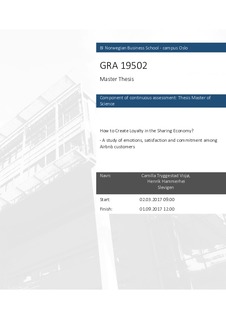| dc.description.abstract | The sharing economy is drastically erupting traditional industries all over the
world, where services such as Airbnb and Uber no longer belong to only the
niche. Over a quarter of US adult internet users - or 56,5 million people - will use
a sharing economy service at least once in 2017, according to recent estimates by
eMarketer. But how loyal are these users? And how can companies make sure that
their services are not only tried once or twice, before people go back to traditional
providers? This study aims to identify and explore the drivers of customer loyalty
in the sharing economy, and particularly the role of emotions, the three
dimensions of commitment and satisfaction. A cross-sectional design has been
used through study 566 active Airbnb-customers in the U.S.
The findings from the study show that Calculative commitment, Affective
commitment, Satisfaction and Negative emotions are significant direct drivers of
Loyalty among Airbnb-customers. No significant direct effects of Sustainable
commitment or Positive emotions on Loyalty was found. However, Positive
emotions do play a major role in predicting customer loyalty, as it has strong
indirect effects through Satisfaction and Affective commitment. The results also
show that customers using Airbnb out of pleasure (hedonic user motivation) have
significantly higher levels of Positive emotions, Loyalty, and all three types of
commitment, compared to customers using Airbnb because it solves a functional
need (utilitarians), who have significantly higher levels of Negative emotions.
We recommend managers not to underestimate the effect of calculative and
rational measures such as price and switching cost in the sharing economy.
Calculative commitment, which deals with this particularly, was found to be the
strongest of the three commitment drivers on Loyalty. However, the total effect of
Positive emotions, as well as the direct effect of Negative emotions, were also
found to be significant drivers of loyalty, suggesting that affective measures are
equally important when creating customer loyalty in the sharing economy. Of
particular interest is the fact that Negative emotions have a direct negative effect
on customer loyalty – while Positive emotions do not. Thus, managers should be
aware that Negative emotions can be especially detrimental to customer loyalty in
the sharing economy. A clear recommendation is then to focus on reducing
negative emotions, such as fear, worry and guilt, through for instance campaigns
focusing on risk reduction. | nb_NO |
